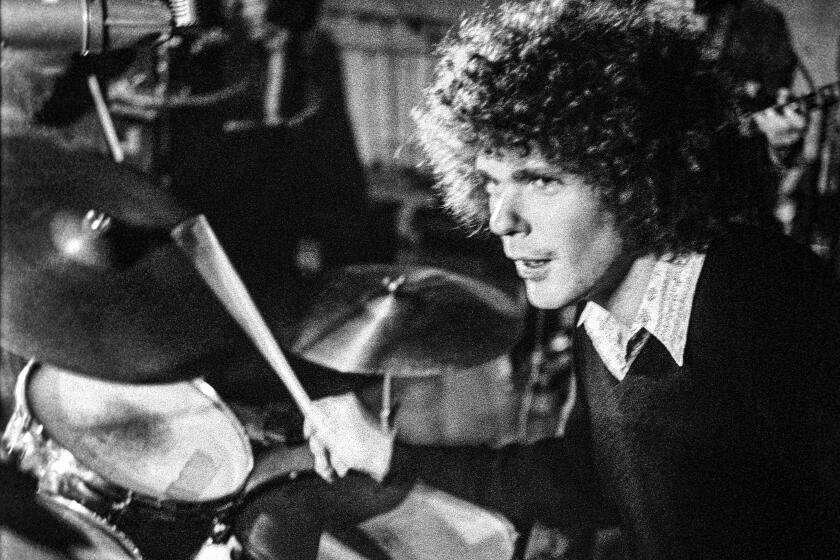Country-Kink Put-On Dismissed as So Much Kitty Litter
“I’m not afraid to die,” I said. “I’m not afraid to live. I’m not afraid to fail. I’m not afraid to succeed. I’m not afraid to fall in love. I’m not afraid to be alone. I’m just afraid I might have to stop talking about myself for five minutes.”
--Kinky Friedman, from his new mystery novel
“When the Cat’s Away”
It would be difficult to think of a greater indignity for a musician than to have one of your performances outdrawn by a lecture on dental hygiene for cats.
But for Kinky Friedman, the one-time leader of the Texas Jewboys--who parlayed infamy as a country-western singer into defeat in a 1986 race for justice of the peace in Texas, then launched his latest career: mystery novelist--indignity has become a professional trademark.
“People who come to cat shows are more into cats than Kinky,” Friedman, 43, grumbled Friday at the International Cat Show in Anaheim.
“It was a stupid idea to perform,” said the erstwhile performer, who habitually refers to himself in the third person.
Friedman’s latest mystery, “When the Cat’s Away” (Morrow, $16.95) is set in a cat fanciers’ convention, and so he came from his Texas ranch to hawk the novel among Southland feline enthusiasts.
Several minutes before, Friedman had begun a set with perhaps his most famous song, the 1973 anti-war ballad, “We Reserve the Right to Refuse Service to You”:
“ Take your business back to Walgreens / Have you tried the local zoo ?/ You smell just like a Communist / You come through just like a Jew ,” he sang, to the confusion of cat lovers who had interrupted their perusal of “No More Odor” kitty-litter boxes and organic pet food products to attend his “Kinky Friedman and Friends” show in a dimly lit corner of the Anaheim Convention Center.
But when those 26 people began to drift away before the set’s fourth song, the Kinkster, as he likes to be called, canceled the show.
“We’ll be back tomorrow with a major show with many, many more Americans there,” Friedman promised his remaining fans.
Later, the author of songs including “They Ain’t Makin’ Jews Like Jesus Anymore” and “The Ballad of Charles Whitman” (about the University of Texas sniper), glumly noted that the cat dentistry lecture, replete with slides, drew more than 100 spectators to the stage where he had performed minutes before.
In the early 1970s, Friedman ventured into the country-music scene with his Texas Jewboys, using a musical idiom dominated by cheatin’ heart tunes to make statements of social significance--or at least provocation.
Satirical songs such as “Get Your Biscuits in the Oven and Your Buns in the Bed” gained the attention of critics and country stars. His recordings were produced by such figures as Waylon Jennings and Willie Nelson. In 1976, Friedman and the Jewboys were among Bob Dylan’s opening acts in the Rolling Thunder Revue.
But regard from such high corners was of scant help in penetrating the conservative country music market, which looked with suspicion on “singing Texas Jews.” Friedman, who was kicked off many a stage by club owners or audience members offended by his act, recalls that time with some bitterness.
“I was totally unsuccessful, but I had a lot of things going against me as a country singer,” Friedman said. “I had a college education, for one. I come from an upper-middle-class Jewish home, and that’s not really conducive to country singing, either.”
But Friedman, born in Wyoming and raised in Texas, hardly fits the image of the self-consciously Jewish performer. Dressed in cowboy gear, attempting to ingratiate himself to women through simulated flatulence and a stream of ethnic insults and obscenities, Friedman chomps on cigars, drinks Jim Beam straight from the bottle and generally remains the cultural anomaly he has been for the last 15 years.
After the Jewboys “went on sabbatical” nearly a decade ago, Friedman supported himself by playing at New York’s Lone Star Cafe, spending part of the year in Texas, the other in Greenwich Village.
In the early 1980s, “things were not doing so well for the Kinkster,” Friedman recalled.
“Like Sherlock Holmes, I’ve had some trouble with cocaine. The architecture of my personality is normally so repellent, there’s no telling what drugs would do to it. And my career was about wiped out, professionally.”
But in 1985, another chance to make history came to Friedman, the man who claims that as a Peace Corps volunteer in 1968, he introduced the Frisbee to Borneo. While walking through Greenwich Village, he spotted a woman being attacked and rescued her.
“There were 40 androgynous men standing around and not doing anything,” Friedman said. “I held the guy until the police came.”
Friedman’s heroism made the New York Post and spurred him to think seriously about crime and its tangents, he said.
One idea sparked by the incident didn’t quite pan out: Friedman lost a 1986 race for justice of the peace in Kerrville, Tex., despite the support of such expatriate Texans as Larry L. King, who wrote “The Best Little Whorehouse in Texas.”
But another approach, undreamed of during the heady heyday of the Jewboys, was literature. Friedman wrote a detective novel, “Greenwich Killing Time,” which featured a hero named Kinky who is indistinguishable from the author, both in the eccentricity of his outlook and in the insensitivity of his attitude toward women, homosexuals and others.
The book received mixed reviews from critics who couldn’t decide whether Friedman was surprisingly refreshing or merely grating, but mystery fans were impressed. “A Case of Lone Star” followed in 1987; “When the Cat’s Away” will hit bookstores in August.
Friedman said he prefers the life of an author to that of a music star: “You can be as arrogant, pretentious and self-important as you like, and people love it. You can go on talk shows and be as obnoxious or crashingly boring as you want and people love it.”
Mindful, however, that his career as an author might turn out to be as unsteady as his days in music or politics, Friedman was ever concerned about his image in the press.
“Write whatever you want,” he said, “just don’t say this opportunistic Jew is out here to take advantage of the cat people.”
More to Read
More to Read
More to Read
Sign up for our Book Club newsletter
Get the latest news, events and more from the Los Angeles Times Book Club, and help us get L.A. reading and talking.
You may occasionally receive promotional content from the Los Angeles Times.






